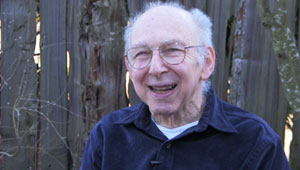Older people can learn to spend less time sitting down
Coaching helped Group Health patients sit half hour less per day in pilot study
SEATTLE—“I feel lethargic when I sit all day,” said Gerald Alexander, an 82-year-old retired social service worker among the 25 Group Health patients who participated in the Take Active Breaks from Sitting (TABS) pilot study. “I feel much peppier when I stand and take walks.”
Retirement may be more golden if less of it is spent in a resting position. Yet older adults spend an average of 8.5 waking hours a day sitting or lying down, according to TABS study leader Dori Rosenberg, PhD, MPH, an assistant scientific investigator at Group Health Research Institute. More of this kind of time has been linked to obesity, heart disease, diabetes, and death—even if people are physically active at other times of the day.
“We’re not sure whether older people can improve their health by reducing the time they spend sitting,” Dr. Rosenberg said. “To prove that, we need randomized trials—and none have been done yet in older adults.” As a first step toward such a trial, she conducted the TABS study, which showed that it was feasible to coach adults aged 60 and older to spend less time sitting: an average of 27 minutes less per day. They reported feeling more able to accomplish everyday tasks. And data suggested that after coaching, they also walked faster and had fewer symptoms of depression.
Health Education & Behavior published the new study’s quantitative results: “The Feasibility of Reducing Sitting Time in Overweight and Obese Older Adults.” And The Gerontologist published its results from interviews with participants: “Motivators and Barriers to Reducing Sedentary Behavior Among Overweight and Obese Older Adults.”
How coaching worked
In the TABS study, health coaches talked by phone with each participant five times during eight weeks. The coaches used motivational interviewing to engage participants in setting personalized goals to sit less by standing and moving more—and to take more breaks from sitting throughout the day. Participants tracked how much they thought they were sitting. And at baseline, midway through the study, and at its end, participants used two devices for a week to measure how much they were sitting. They also received charts showing feedback from these measurements. Participants found the feedback charts most helpful, followed by the coaching phone calls.
“The feedback was like a reward for standing up and moving,” Mr. Alexander said. Read more of his story in a blog post: “Standing up for my health.”
The Group Health Research Institute’s development fund supported this study. Dr. Rosenberg is continuing her research on the effects of sitting time in older adults through her recently funded career development award from the National Heart, Lung, and Blood Institute of the National Institutes of Health (K23HL119352).
Dr. Rosenberg’s coauthors are David Arterburn, MD, MPH, an associate investigator, Salene Jones, PhD, a research fellow, and Anne Renz, MPH, a project manager, all at Group Health Research Institute; Nancy Gell, PhD, MPH, PT, an assistant professor of rehabilitation and movement science at the University of Vermont School of Nursing and Health Sciences; Jaqueline Kerr, PhD, an associate professor of family medicine and public health at the University of California San Diego, in La Jolla; and Paul Gardiner, PhD, one of Dr. Rosenberg’s coauthors. Dr. Gardiner is a postdoctoral research fellow in public health at the University of Queensland, in Brisbane, Australia.
About Kaiser Permanente
Kaiser Permanente is committed to helping shape the future of health care. We are recognized as one of America’s leading health care providers and not-for-profit health plans. Founded in 1945, Kaiser Permanente has a mission to provide high-quality, affordable health care services and to improve the health of our members and the communities we serve. We currently serve more than 12.4 million members in eight states and the District of Columbia. Care for members and patients is focused on their total health and guided by their personal Permanente Medical Group physicians, specialists and team of caregivers. Our expert and caring medical teams are empowered and supported by industry-leading technology advances and tools for health promotion, disease prevention, state-of-the-art care delivery and world-class chronic disease management. Kaiser Permanente is dedicated to care innovations, clinical research, health education and the support of community health. For more information, go to: kp.org/share.
for immediate release
Media contact
For more on Kaiser Permanente Washington Health Research Institute news, please contact:
Amelia Apfel
(425) 507-5455
After-hours media line: (206) 287-2055
![]() @KPWaResearch
@KPWaResearch
co-researcher
David E. Arterburn, MD, MPH
Senior Investigator
Kaiser Permanente Washington Health Research Institute
Featured video
Get up, stand up: Pilot study coaches older adults to take active breaks from sitting
(YouTube, 2:40)




